
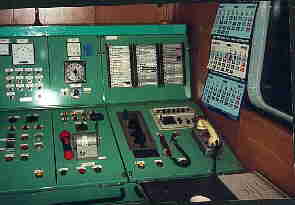


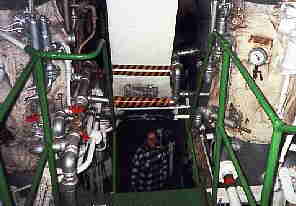
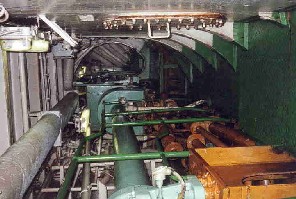




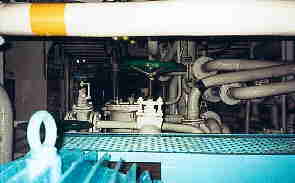
Engine room
 |
 |
 |
 |
||
 |
 |
 |
 |
 |
 |
 |
"The engine is the main job of the ship", says Anatoly, 2nd Engineer of the MIR. "Sails, that's just romantic - for girls like you, Barbara, or for the captain or chief mate - but if the engine is broken, the ship is dead." It is 2 p.m. and we are in the engine control room. I, normally more interested in the work on the deck, the bridge or aloft, visit the engine crew for a while. On the deck it is raining. The wind is coming from ahead. This means we proceed under engine. The main engine consists of 2 identical Sulzer diesel motors with 520 hp each. Together they can make she ship sail more than 12 kt under ideal weather conditions. At the moment we are making about 6 kt due to the sea state of 5-6 and the direction of the wind.
While I drink a cup of tea I learn that the engine provides a lot of hard work all day long 24 hours a day in 3 watches. Not only, when the main engine is on like now. When the ship is under sails, there has always to be 1 motorman and 1 engineer on his post to check all the things that are ruled by the engine apart from motion. These are for example the trimming of the ship to work against the healing produced by the sails, the fresh water and the hot water for the ship, all electricity, air conditioning, ventilation and the temperature in the freezers of the stores for the galley. "The ship can do nothing without the engine. If the engine is broken, the ship will not get the permission to leave the port," Anatoly goes on with his explanations about his job. He is right. Without electricity, we have no radar, no gyro compass, not even light. Not only the aisles in the lower decks would be dark - no, the position lights would also not work. The cook could not prepare a meal, the doctor could not make a diagnosis, the cadets could not learn, the sailmaker not sew. Without water the toilets would not work, not to mention things as showers, washing machines, well and something exotic: the ship's sauna that is also worked by the engine.
A little later we are under sails. I return to the engine control room. Nobody is there. I ask one of the cadets, where I could find my friends from the engine crew. Inside the engine, of course. When MIR is under sails, maintenance work is done at the main engine. This work can only be done when it is switched off. But everything has to be planned carefully as the engine must always be ready to get started again during 30 minutes. Bigger repairs can only be made in port, when everything can be switched off for some days and electricity can be taken from the shore.
The engine crew consists of chief engineer, 2nd-4th engineer, chief motorman, 3 motormen. During the summer there are also students from the academy who work as additional motormen and up to 6 'mashin-cadets' who are serving their first sea practicum on MIR. But the work with the engine is not all. Everybody working on MIR (or any other sailing vessel) has his or her position during the sailing alarm. So if the bell rings, all engine crew goes to the deck to work there and even go aloft with all the others. Only chief engineer remains in the engine control room. It is his manoever position. Everybody else is doing able seaman's work, even the officers. Of course, during the summer there are enough cadets on board to do all this work and the engine crew serves only as auxillary deck's crew. A different situation is found during the winter, when MIR sails only with the permanent crew of about 30 persons or during daytrips, when many cadets remain ashore to make room for the passengers. Then the work aloft is obligation for everybody physically able to do it.
Meanwhile it is 3.30 p.m. - time for the afternoon meal. I thank Anatoly for the tea and his time and leave. Tonight when I am in my bunk, I will hear the sound of the engine like always. It won't disturb me as now I know that as long as I hear it, the ship is alive.
MIR's engine crew
 |
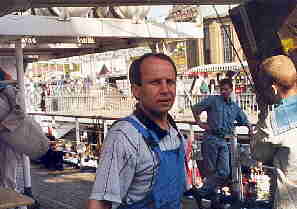 |
 |
 |
 |
Text B.B. September 2001, photos Stefan Heidenreich April 1999.